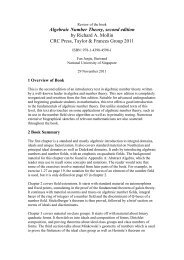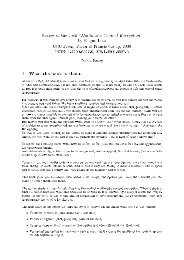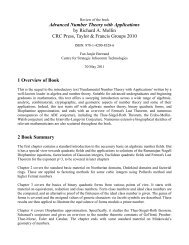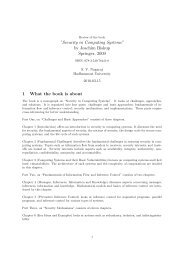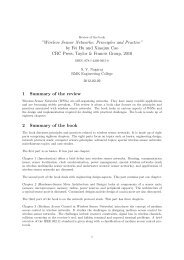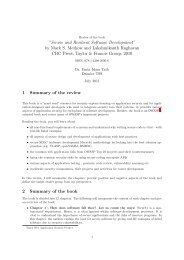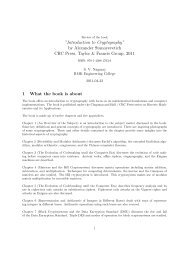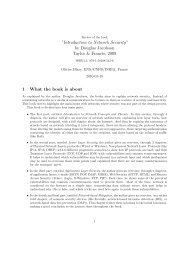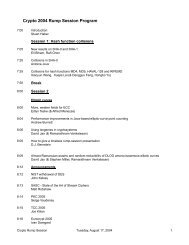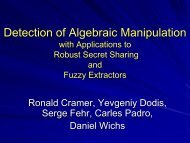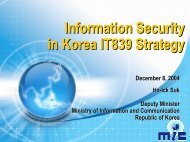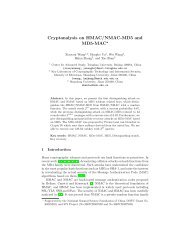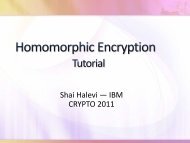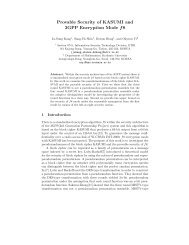1 Montgomery Modular Multiplication in Hard- ware
1 Montgomery Modular Multiplication in Hard- ware
1 Montgomery Modular Multiplication in Hard- ware
You also want an ePaper? Increase the reach of your titles
YUMPU automatically turns print PDFs into web optimized ePapers that Google loves.
FEI KEMT<br />
5 True Random Number Generator - prelim<strong>in</strong>ar-<br />
ies<br />
Random values play a crucial role <strong>in</strong> several areas of science. In dependency on field<br />
of application the requirements for parameters of random sequence and generator<br />
of sequence itself may vary. Focus<strong>in</strong>g on the sequence orig<strong>in</strong> we dist<strong>in</strong>guish between<br />
truly- and pseudo-random sequences. The construction of generators decides on<br />
their suitability for commercial or research applications.<br />
In the follow<strong>in</strong>g chapter we provide an <strong>in</strong>troduction to the topic of randomness<br />
and random values (Section 5.1) while focus<strong>in</strong>g on generators applicable <strong>in</strong> cryptog-<br />
raphy. In Section 5.2 we mention typical sources for generation of random sequences<br />
<strong>in</strong> digital circuits. In Section 5.3 we summarise design ideas of the PLL-based gen-<br />
erator we will analyse <strong>in</strong> the follow<strong>in</strong>g chapter. In Section 5.4 we expla<strong>in</strong> test<strong>in</strong>g<br />
techniques applied <strong>in</strong> order to evaluate generators and <strong>in</strong> Section 5.5 we discuss is-<br />
sues related to attacks on RNGs. F<strong>in</strong>ally, <strong>in</strong> Section 5.6 we summarise the chapter.<br />
5.1 Randomness<br />
We start with topic called randomness, and the most natural questions that come<br />
<strong>in</strong> our m<strong>in</strong>ds may look like: How to def<strong>in</strong>e the randomness? Where comes it from?<br />
Or how can we prove that a sequence is random?<br />
The randomness of the world we live <strong>in</strong> has been a scientific and philosophical<br />
topic for long time. Famous remark of Albert E<strong>in</strong>ste<strong>in</strong> says that “God does not<br />
play dice with the universe” what might conv<strong>in</strong>ce us about determ<strong>in</strong>ism of our<br />
environment. However, several physical phenomena present <strong>in</strong> physical world are<br />
proved to have a random nature e.g. probabilistic nature of quantum mechanics,<br />
thermal and shot noise <strong>in</strong> electronic components, or nuclear decay.<br />
The fundamental problem of randomness is <strong>in</strong> fact that even with exact def<strong>in</strong>ition<br />
it is very difficult to prove whether any f<strong>in</strong>ite numeric sequence is random or not. The<br />
randomness of a source is evaluated through the parameters of sequence generated<br />
us<strong>in</strong>g that source. The way how the values of sequence are extracted from the source<br />
depends on applied harvest<strong>in</strong>g mechanism. The optimal harvest<strong>in</strong>g does not disturb<br />
the random physical process and extracts as much entropy as possible.<br />
The entropy H of a random variable X with n outcomes �<br />
xi : i = 1, . . . , n �<br />
is<br />
def<strong>in</strong>ed as negative logarithm of the probability of the process’s most likely output<br />
71



